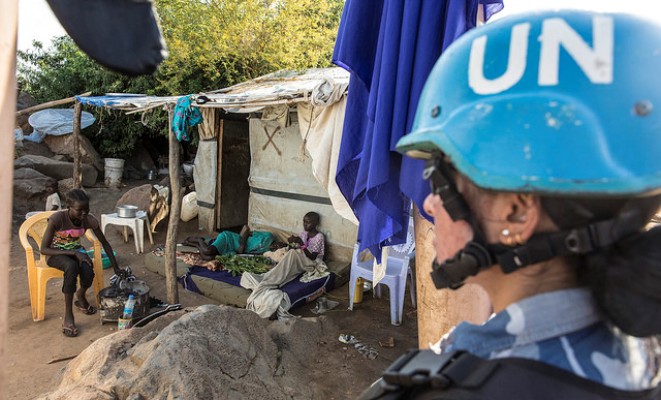South Sudan sets new conditions after accepting deployment of protection force

September 6, 2016 (JUBA) – South Sudanese government under the leadership of President Salva Kiir has come out with contradicting statements less one day after reaching a consensus with the members of the United Nations Security Council to deploy a protection force from countries in the region. The government has instead said it would only accept such deployment if troops contributing countries would not be from the regional countries with which it shares immediate borders.
Presidential spokesperson, Ateny Wek Ateny, said in a statement that it was made clear during the meeting with the delegation of the United Nations Security Council that the South Sudanese government would not accept deployment of troops from countries sharing immediate borders with the young nation “because they have interests in the country.”
“The Security Council agreed to take into consideration the position of the Government of South Sudan that the troops contributing countries must be countries other than our immediate neighbours, meaning the six bordering countries to South Sudan must not be part of troops contributing countries. And this came on the line that some of our neighbouring countries have already developed conflicting interests,” said Ateny.
Both Uganda, which is allied to President Kiir’s government and fought on its side for two years, and Sudan, which is accused of supporting Riek Machar’s faction, had earlier declared that they would not be part of the troops contributing countries. However, Kenya, Ethiopia, Rwanda and any other country in the region would contribute troops.
It was not clear which other country in the region the government did not like and was targeting. The government did not also bring up the matter as a concern during the talks with the United Nations Security Council members in Juba who discussed the deployment with President Kiir.
Ateny however explained that the circumstance under which the government made a compromise was because of interest of forging a better working relationship with the United Nations Security Council and larger international community and in compliance with its earlier commitment during the IGAD Extraordinary Summit in the aftermath of the July events at which two armed forces clashed at the presidential palace in Juba.
The United Nations Security Council, he said, also agreed that the troops contributing countries and the leadership of the United Nations mission in the country and government of South Sudan will continue to work out modalities of the deployment, building upon the consultations of 25 August and 1 September, 2016, respectively, where further discussions were anticipated.
“That means nothing is fully concluded without such consultations in place,” Ateny warned.
Other government officials, including information minister explained that the “consent” which the government has given means that it has agreed in “principle” to the deployment of foreign troops but not necessarily “acceptance unconditionally.”
Minister Michael Makuei Lueth argued during a press conference on Monday that the consent was given by the government to enable discussions to take place between the United Nations mission in the country, the army, and other stakeholders in order to work out modalities.
On Monday, the Associated Press (AP) quoted minister Lueth as also announcing dramatic limits on a 4,000-strong new peacekeeping force, saying anyone who enters without consent is an “invader.”
“4,000 is the ceiling, but we are not duty-bound. We can even agree on 10,” Lueth said.
The statement challenges the agreement reached between the government and the visiting UN Security Council after meeting President Salva Kiir on Sunday and emerged with a joint statement accepting the new UN mandated regional protection force.
Cabinet affairs minister, Martin Elia Lomuro, told reporters the government must first agree on the number of troops, the countries they come from and the arms they will carry.
The regional force has a specific mandate to protect civilians, vital installations and safeguard humanitarian activities.
Both civilians and foreigners, including relief workers, were targeted in the chaos by South Sudanese soldiers who raped women and girls, conducted mock executions and forced people at one hotel compound to watch a local journalist be shot dead.
The visiting Security Council diplomats met with civilians who pleaded for the new protection force.
“I want this country to be peaceful so my children can go back to school,” AP quoted Rebecca Julio, a mother of four.
The Security Council’s members visited the internally displaced persons (IDPs) in both Juba and Wau, where the IDPs told stories of horrors, accusing government’s forces of killing and torturing people and raping their women and girls.
The Council also met with the chairperson of the Joint Monitoring and Evaluation Commission (JMEC), Festus Mogae, who leads the body responsible for overseeing the implementation of the August 2015 peace agreement.
The UN Security Council members also met in Addis Ababa, Ethiopia, with the Ethiopian Premier, Hailemariam Desalegn, and discussed the deployment of the regional troops to Juba. Desalegn, who chairs IGAD assured the Council’s members that chiefs of staffs of respective armies in the region were making preparations to deploy the forces to Juba “soon.”
Analysts and observers are keen to say the shift from the language of the communiqué by the South Sudanese government officials is an attempt to allay fears from senior government officials who accuse president Kiir and some of his moderates of having allegedly betrayed them after sponsoring demonstrations to oppose the troops’ deployment.
(ST)
